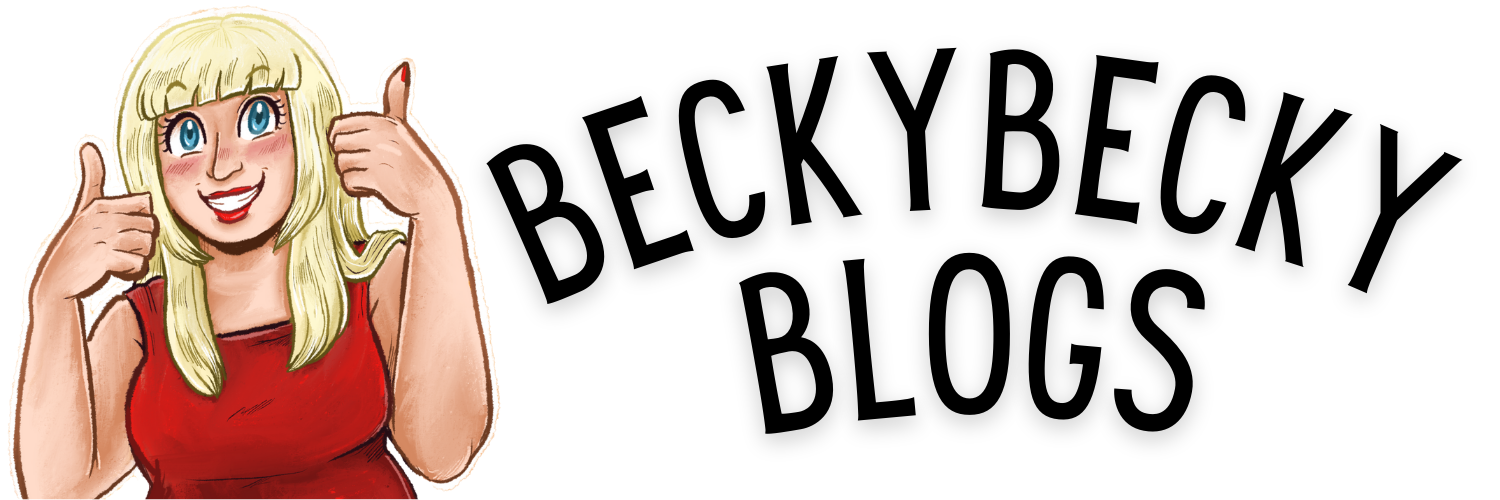Tis the season for disturbing gameplay, apparently. After last month when I played the Cheka, the brutal Bolshevik secret police, last weekend I ended up on Saddam Hussein’s council.
Undeniable Victory
The game was the Iran-Iraq war in the 1980s. Game designer Ben Moores was upfront about the fact he’d chosen a relatively unknown war, despite how recent it was – you just don’t learn about it at school. But he found it fascinating enough to make the subject of his second game (after the fantastic The Spanish Road).
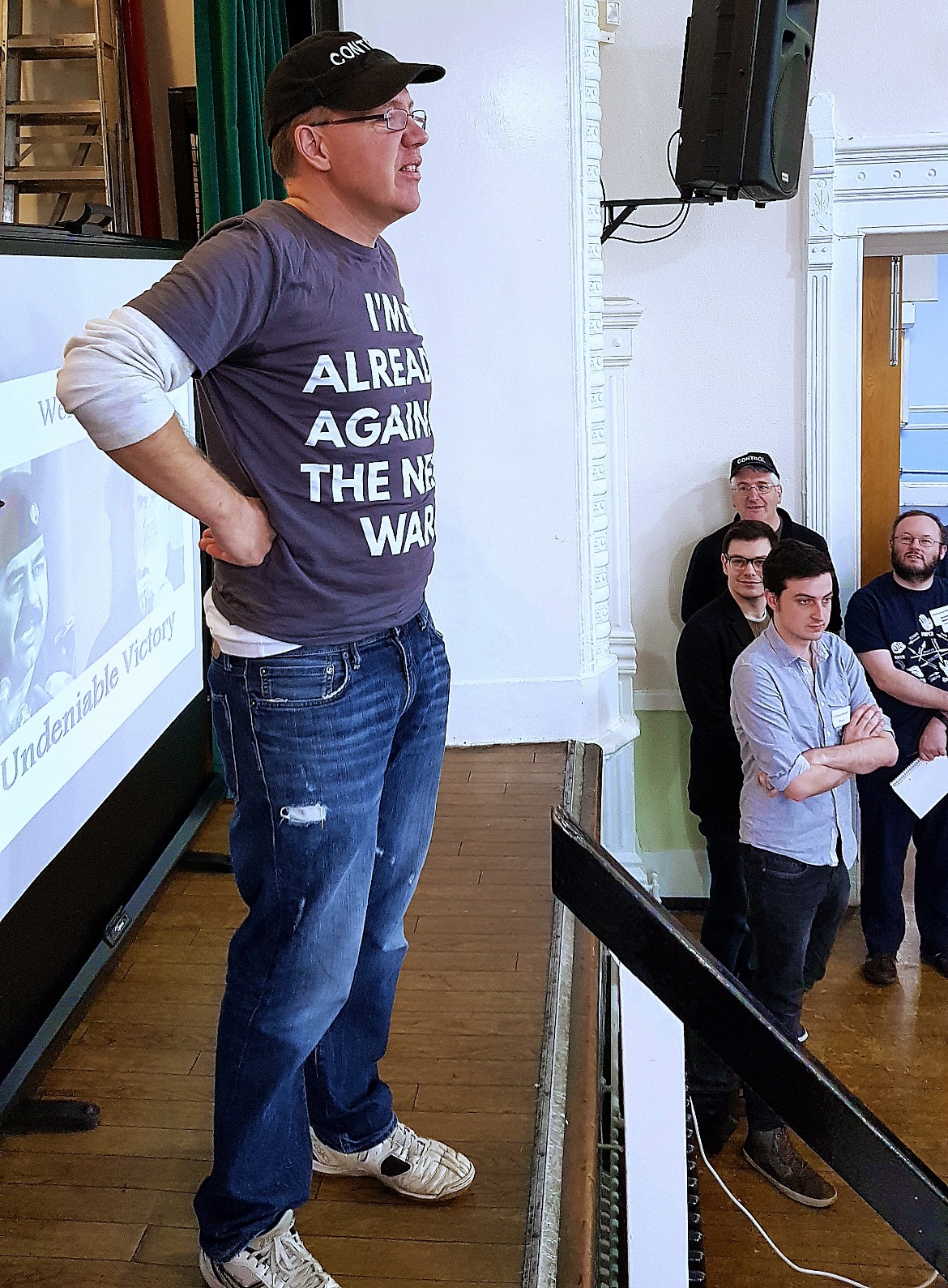
All the players belonged to either Iran OR Iraq, with the other involved parties represented by control. It was also a game with no out-and-out traitors, which was actually pretty refreshing after a number of games that skewed the other way.
Each game was divided into three levels of players. At the bottom of the totem pole, we had our operational players on the ground, who were the only ones allowed near the map table.
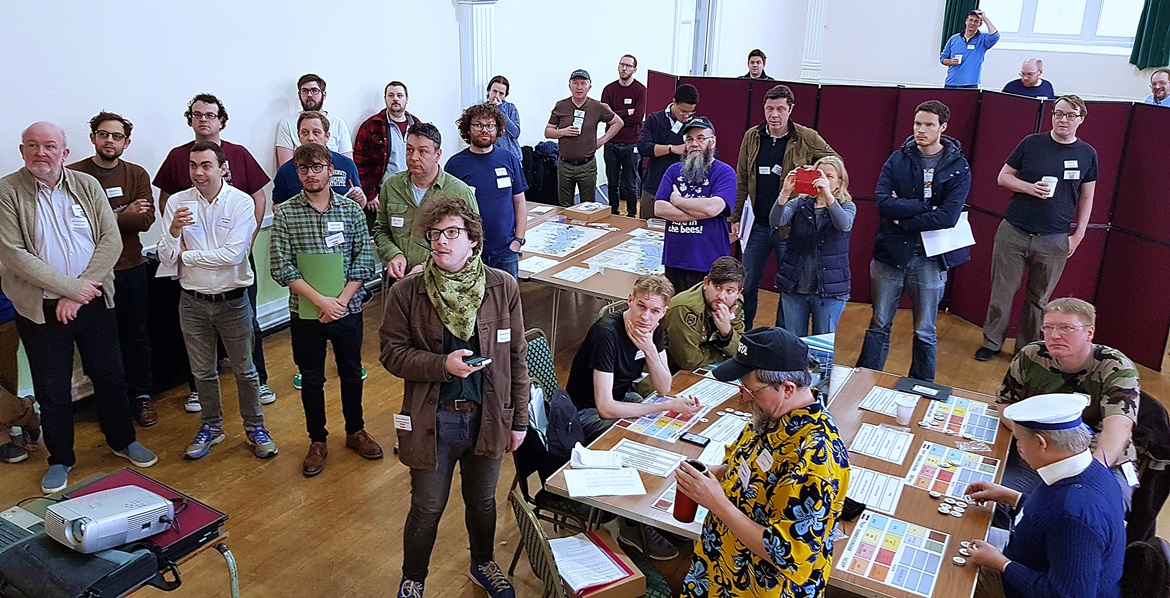
One step up was HQ, where strategic decisions about the war took place.
And at the top was the council – reporting to the Ayatollah on Iran’s side and Saddam Hussein on Iraq’s. Made up of 7 players and a control to do the difficult job of dreadful dictatorship, our task was to keep the country running and the war going.
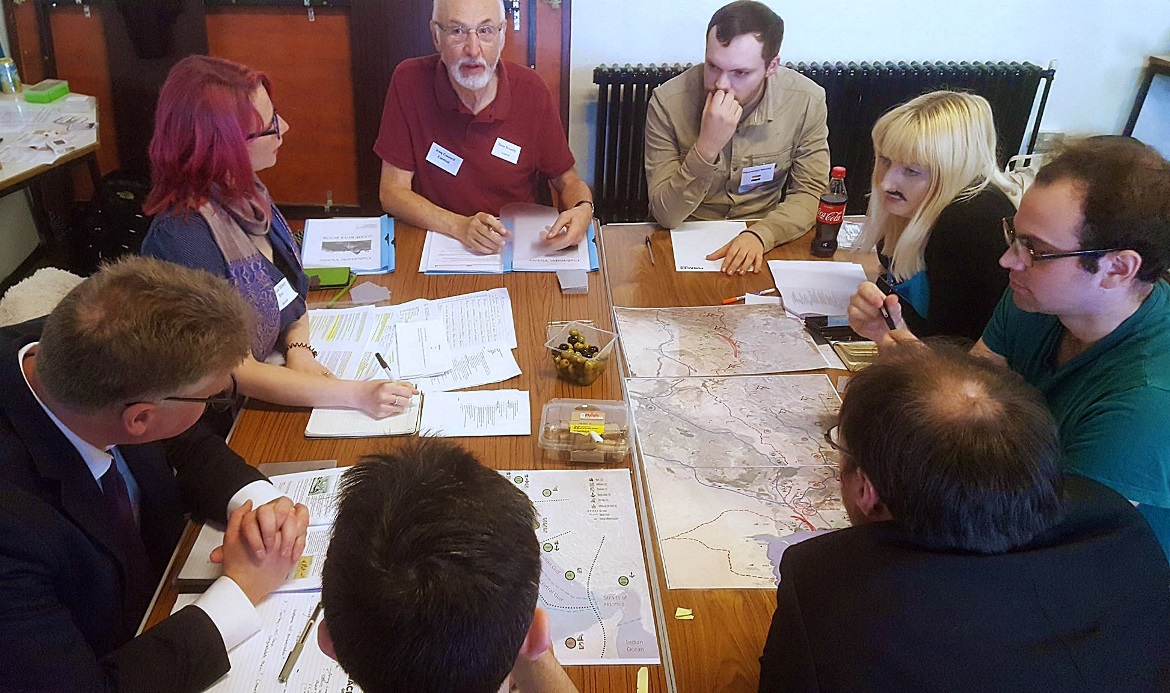
I started the game as Iraq’s Interior Minister, Sadoun Shakir. But in a game where you could rise high and fall hard, who knew where I’d end up.
Bad News
The game started on a terrible note. The USSR announced an arms embargo. We knew that Iran’s imperialist backer, the USA, had fallen out with them pre-war, so we figured this was a way to even things up.
To get back at them, we invited an American ambassador to Baghdad. This would be the first step of many that took us a long long way away from real history.
At the same time, news began to trickle back from the front. The lines were holding in the north and central reasons, but the south was a different story. Our key naval base, Al Faw, fell immediately, despite having been highlighted as somewhere to hold onto at all costs. Clearly someone had messed up.
My first execution of the day was Lt General Fiona, and we hoped that executing her in front of her team would send a message. Unfortunately, lack of discipline in their ranks meant that at the end of turn two, we summoned them all to the council.
The three Major Generals (now including Fiona, revived) were suitable unnerved. But I had my first blatant insubordination of the day – while summoning the newly promoted Lt General, a member of the HQ spoke over me and sent him back to the map. I tried to speak up, but was completely ignored by both players. As their senior commander, I was furious.
With the support of the council, the HQ member was demoted, and the Southern army actually went on to become one of the most productive parts of the war effort. This only fed into our theory – being strict works.
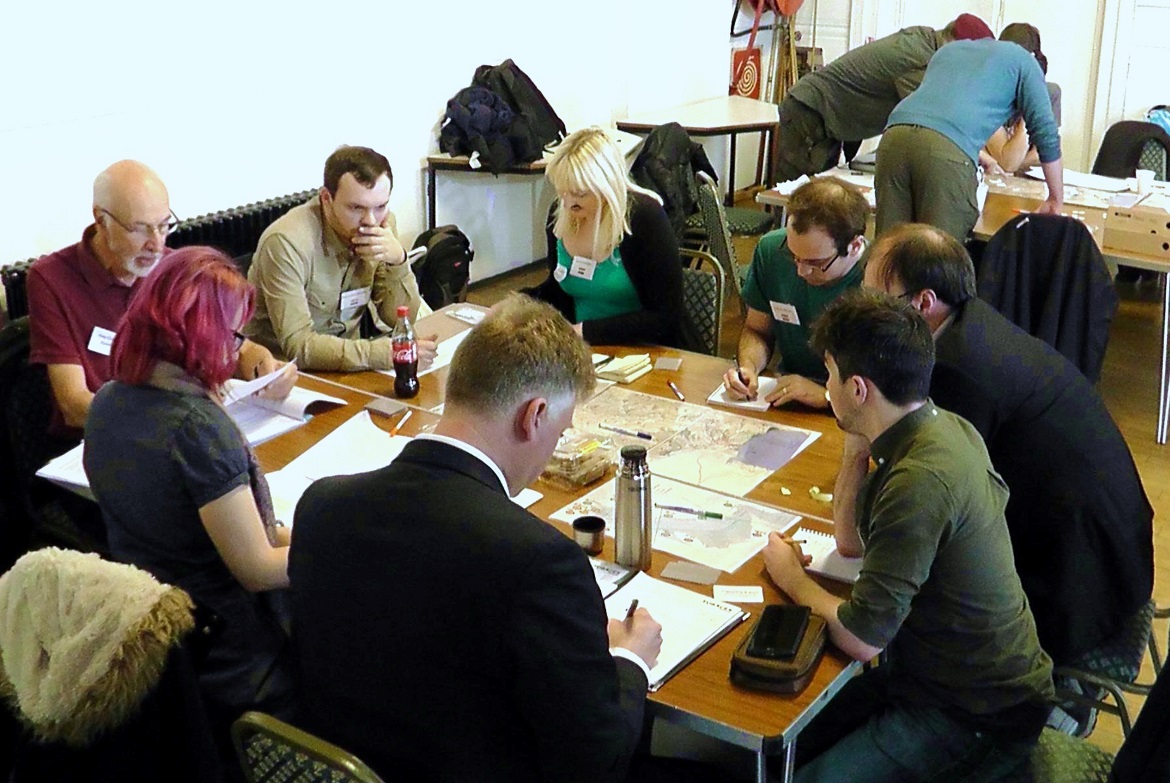
Council Matters
The majority of my day, however, had nothing to do with the war. As a member of the Iraqi council, we had a number of matters to deal with each turn. Firstly, we could each take certain actions pertaining to our roles. Finance had to divy up the budget; defence could change the war goals or demote/promote a player.
My job as Interior Minister was probably the most amusing. Each turn, I had to decide which of three factions – political minorities, economic elites or the Kurds – to blame all the latest problems on. And then I could stir up resentment from one of those factions towards the other side. I focused all my efforts on the Kurds – there was a large population of them in northern Iran, and destabilising their efforts there would hopefully keep some of our crucial oil fields safer. Internal politicking stopped being funded after turn 2 unfortunately, so the resources I had to play with were limited.
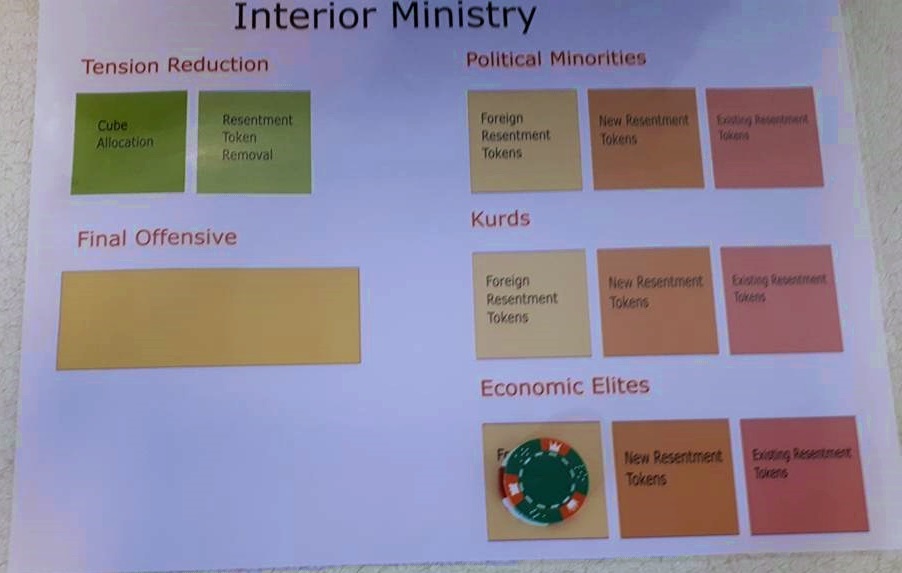
Next up were “Events”. Each turn a seemingly never-ending series of (usually bad) events would be announced to us, and as a council we had to determine how to respond. Some of the events were small and simple to resolve – should we continue funding the Basra canal? Some were more nuanced – Israel has invaded Lebanon, do we denounce them or ignore it? There were even some that were humorous, such as Hussein’s son wanting to become Air Marshall. And some… some were Saddam Hussein getting very angry at us for not meeting his unrealistic targets. And when that happened, you dove for cover… usually by shoving another person into the spotlight.
Tikriti, Ba’ath and the Moderates
There was another aspect to the game that I’ve neglected to mention until now. Each Iraqi player was categorised either Tikriti, Ba’ath, or Moderate. Tikriti, my team, meant that you were a personal friend or family member of Saddam Hussein himself. For example, I was a childhood friend of his. Ba’ath was the Socialist party in power, that Saddam was head of. And the Moderates were non-Ba’ath politicians and military figures.
The Iranians were similarly split into Conservative, Moderate or Radical.
On the council, my only other Tikriti member was the Defence Minister, Chris. Luckily myself and the First Minister had struck up an alliance early on, figuring that if nothing else, we could keep the overly democratic influence of the Moderates as far away from the action as possible. This was a necessary alliance – with three members on the council, they were the largest grouping.
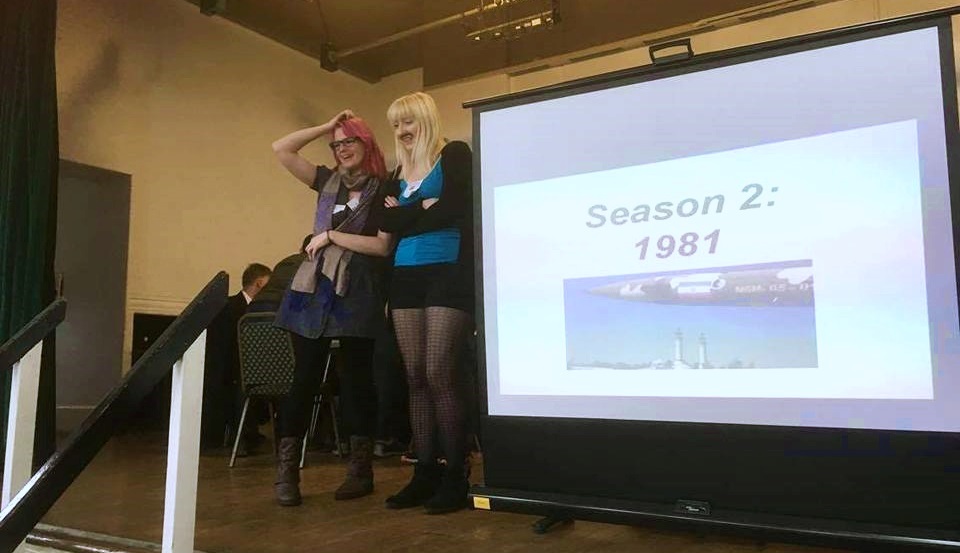
The final part of the Council session was the Agenda, and definitely the part of the meeting where faction rivalries were expected to be most prominent. Here, you could steal the judiciary or legislature (essentially tie-breaks), force two ministers to switch positions, or even kick someone off the council completely.
Unfortunately our control had to leave early on. This had the effect that we had to focus pretty hard on getting through the council on time, as well as remembering to do all the necessary follow up afterwards. What this meant was that our council sessions were certainly a lot less political than they could have been… at least early on!
We quickly determined that there were three “net good” actions for the agenda: more money, more foreign capital and more internal scheming. Each team picked one of these each turn, and for several years we had some measure of peace within the council.
Grand Offensives, Grand Mistakes
One of my other tasks as Interior Minister was to declare Grand Offensives. These were the over-ambitious battle plans ridiculously announced by one side or the other during the historical war. And our game was to be no different. Hussein wanted his grand offensives, and made it clear that he’d have our heads if he didn’t get his way.
To that end, we declared our first Grand Offensive, Epic Win, against… well, to be honest I don’t remember the name. What matters is that I stood up and announced the name, and Chris stood up and announced the target. This was good news for me… because unfortunately we already possessed the place we’d announced as a target.
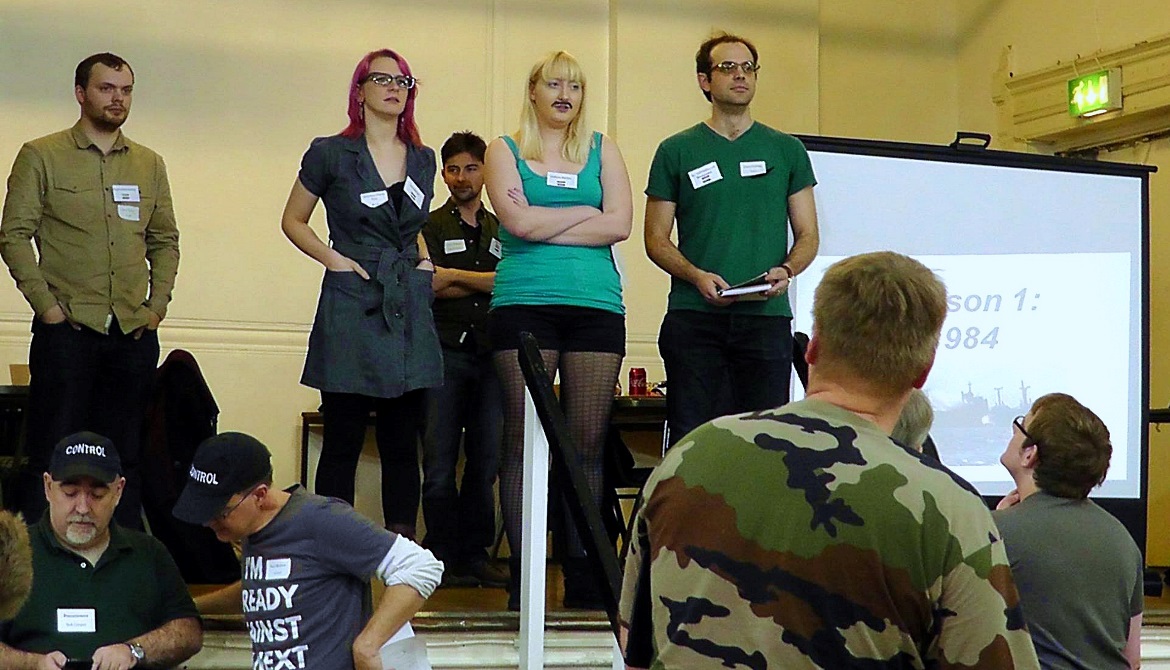
We stood up to issue a Grand Correction and name a new target. But for Hussein, Chris’ card was marked.
Chem Weapons and Misdirection
Procurement Minister Alex brought a suggestion to council. A controversial one, to be sure… the use of chemical weapons.
In some games, particularly Not Over By Christmas, the use of chemical weapons is seen simply as a resource to be deployed when needed. But in the context of this game, it was taken pretty seriously. We were slowly improving our relationship with the USA, and we also needed to stay in Europe’s good books in order to keep their supplies of weapons coming. If we used chemical weapons… we could be shunned.
So Alex suggested an even more outrageous idea. Use chemical weapons… on ourselves.
At first suggestion, it seemed crazy. We would never get away with it! Everyone would know it was us. But the more we discussed it, the more inevitable it seemed. The war wasn’t going well – a few people dropping ties with Iran over use of weapons of mass destruction… would be very handy indeed.
We gave the sign off, then were all ordered to erase the discussion from our memories.
Tide Against Us
There was no denying it. We were losing the war. Each turn Defence Minister Chris would come back with more bad news. This oil field has fallen. This dam has been attacked. They’ve pushed us back. Only the south, reinvigorated thanks to our harsh treatment, were making any headway.
Eventually, the northern line was more of a northern curve. An armoured unit was far too close to Baghdad for our liking. We fired the HQ guy who’d got the Grand Offensive title wrong first. And then Chris was shown the door.
This was terrible news. He was the only other Tikriti member on the council, and I couldn’t stand up for him for fear of being tarnished by the same brush. And when a Ba’ath player from the HQ came over with good news… Procurement Minister Alex pounced. “Here’s the only guy who’s told us the truth all day,” he claimed. Despite my questioning how the hell he actually knew that was true, and my ridiculing that he just liked the guy’s t-shirt, for some reason the Moderates threw their lot in with the Ba’ath and sacrificed their numbers advantage.

Instead, I pushed to become Defence Minister in Chris’ place. It was too important a role, and to have First, Procurement and Defence Ministries all in the hands of the Ba’ath seemed too risky. Little did I know what a poisoned chalice I was drinking from.
How Does The War Work?
Wow, it was a steep learning curve. Going from not needing to see a map at all, to having to report regularly on (and come up with excuses for) the war effort… it was a lot of pressure. For a few turns I completely forgot that the airforce and navy existed. I focused on getting my head around the state on the ground… and it wasn’t a good state. The south was holding, but the north was in dire straits.
Then the air attacks started flooding in. First it was our very palace. Jim came over and shouted at us that we were being bombed. Well, the First Minister and I knew what this meant, and immediately dove under the table, with the rest of the council joining us quickly after. Luckily we all survived the attack, but we were rocked a few minutes later by a second one, on Al Faw.
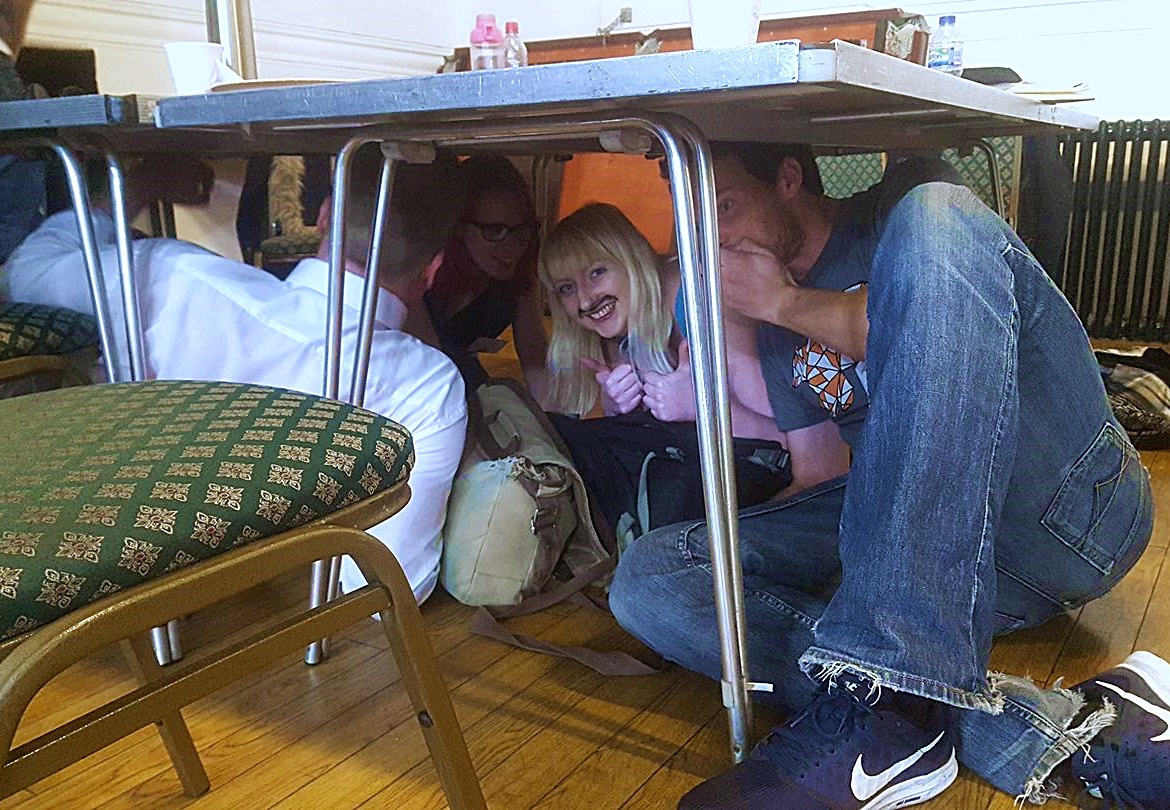
“How could this be allowed to happen?” I was questioned furiously. Honestly… I had no idea, I’d only just remembered we had planes, and I had no idea what they needed to do in order to stop the other planes from attacking us. But I quickly cottoned on to what the job of Defence Minister was really about. If there’s good news, make sure everyone hears it from you. And if there’s bad news, come to the meeting with an alibi and a scapegoat.
I don’t even remember who it was I hung out to dry for this. But he wasn’t the last.
Chemical Weapons? How Outrageous!
The next thing I knew, we’d been hit by a chemical attack. What?? Had the one ordered by our council even landed yet? It took me a few moments to realise… this was that attack. Then, unfortunately I reacted in such a ridiculously over the top way that I think the HQ, who hadn’t been in on it, quickly realised. Oops.
Unfortunately the foreign powers we were trying to bait into reacting against Iran weren’t convinced. The Iranians were indignant. Of course they didn’t chem us! But I like to think that a few people lost their heads over there for it anyway.
Heads Will Roll
Saddam Hussein demanded payback for the chemical weapon attack, so I prepared a second Grand Offensive: Heads Will Roll. Unfortunately, my army were convinced that this wouldn’t succeed. But… if we had any spare chem weapons, that we could now totally freely use in “retaliation”, then that would improve the odds considerably.
About ten times I asked HQ for a target for the Grand Offensive. Ten times I took this to the council, but every time something more urgent came up. I was happy to let the conversation slide away from this almost certainly doomed crusade. I knew if it failed, it would almost certainly be my head that rolled.
A third air attack rocked the council, this time on an oil refinery near Baghdad. The First Minister and I went down and had very strict words with the newest Air Marshall, Stuart.
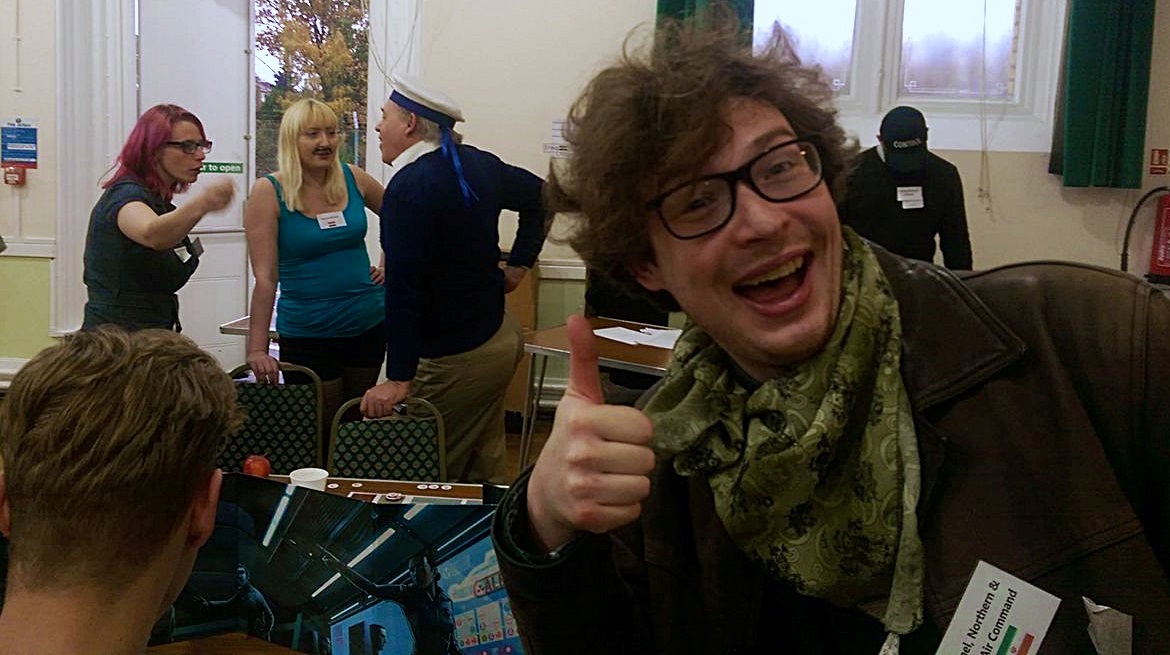
We were running out of experienced air players and reluctant to replace someone this late in the game… but he knew that one more screw up and his life would be on the line.
No Good Options
The reports from the army were that we were losing. Even if I got the chem-assisted Grand Offensive approved, we would die a slow horrible death. We’d taken land in the south, but much less than they’d taken in the north, even if it was richer. Dragging the war out would only delay the inevitable.
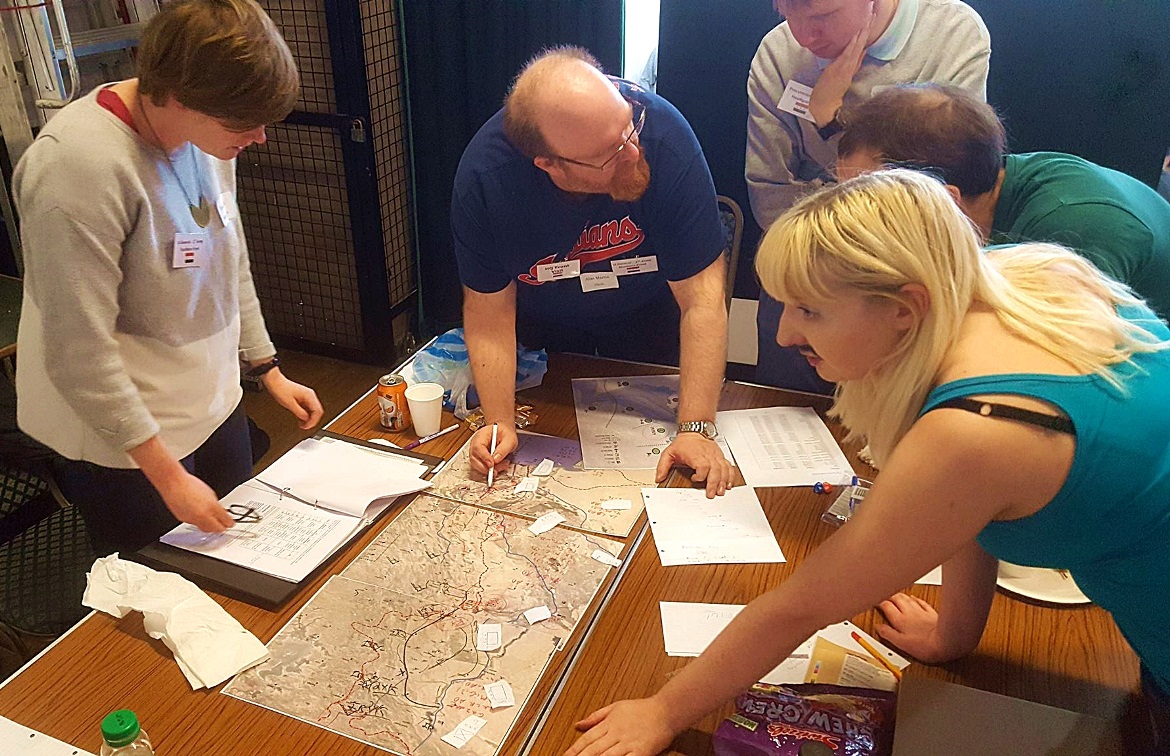
I knew this information when I came back to the table to pitch my Grand Offensive for the last time.
At that moment, Foreign Minister Richard chirped up. While Hussein was out of the room, he floated the idea, that he’d made more casually before, of making peace with the Iranians. But now he also posed the suggestion of something that had been building since turn one. Something that had been on the cards ever since Iran had allied with the USSR. An alliance with America.
When Saddam returned, I think the other six of us held our breath as Richard presented his idea. We were prepared for a quick gunshot to the head. But, ever the seasoned control player, Jim posing as Saddam turned the question back to us.
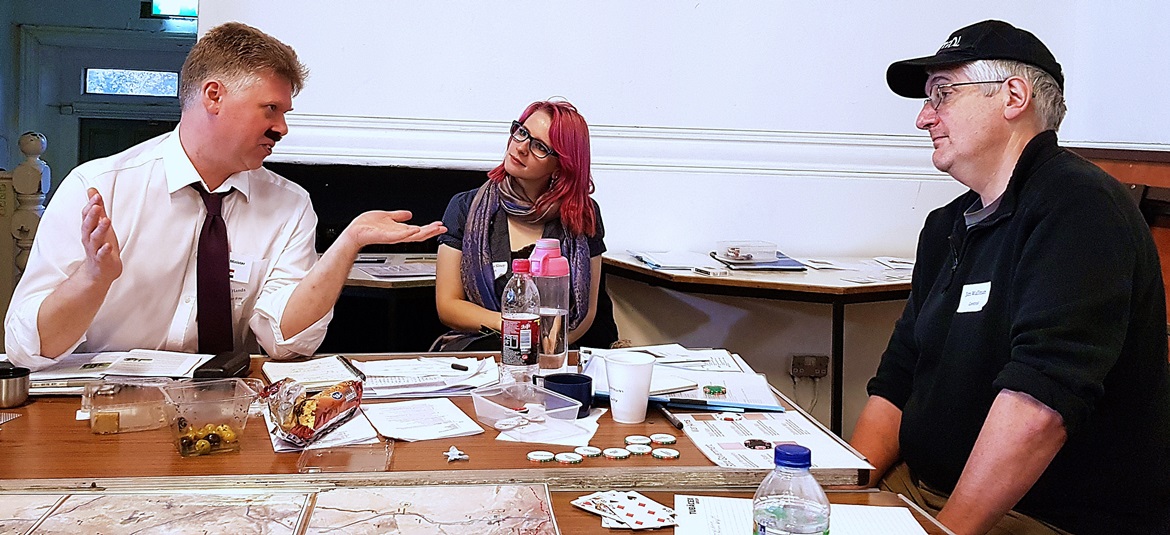
We could have thrown him under the bus, if we’d chosen to. But I knew we were losing the war, and I didn’t want to die.
USA or Bust
There were just two problems. One, we would have to move government structure, to a “Dictated Democracy”. This was directly against one of my core aims, to move the structure in the opposite way, to a “Cult of Personality”. But we could change and then change back, and I saw the way the tide was flowing.
The issue that stuck in Saddam’s throat more was to officially recognise Israel.
We voted. I was last to vote, but I refused to be the sole hold-out. Jim stood up and announced his recognition of Israel. And then announced the new credit line opening up between us and America.
The reaction of the Iranian team was picturesque. Shock and amusement at the first announcement was swiftly followed by dismay and despair.
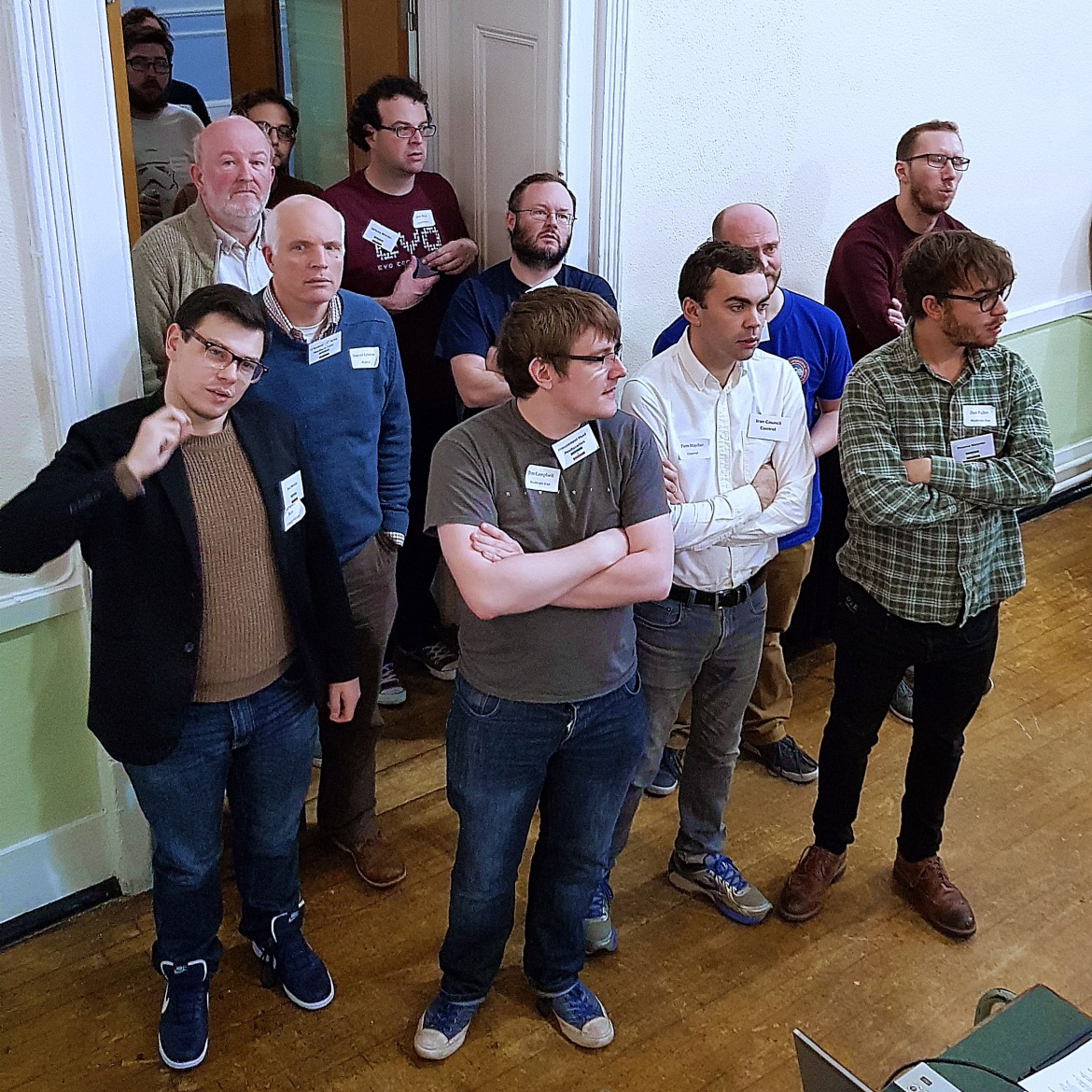
We had the big boys on our side now.
Good News At Last
Thinking I had finally got the job of Defence Minister under control, I sat down for the next council session. I gave my report, although I left out a major truth: that even with the increased funding from the US, we just didn’t have the men to keep the war going. But we were holding on for now.
“So nothing was destroyed this turn?” “No,” I replied confidently. I hadn’t actually asked, but no one had said anything was.
Then I heard victorious shouting from the air table. Rushing over, I got the news firsthand and was able to return, pumped up, to the Council table. Kharg had been utterly destroyed by the air force. Iran’s economy was rocked to the very core. Stuart kept his life. And I was taking all the glory – clearly it was down to my leadership that we’d had our first major victory of the day.
Iraqi Roulette
Minutes later, Saddam!Jim stormed over. Apparently his dam had been destroyed. He was very unhappy about this. Apparently it was a Sad-dam (#sorrynotsorry). He demanded to know who would pay for this.
His gaze turned to Alex, as he handed him a dice and warned “don’t roll a one”. His revolver’s cylinder spun dramatically (and imaginarily), a single bullet inside that would soon be entering one of our skulls.
It was at this moment that I knew I was about to die. Alex glanced at me, and shiftily asked if we could move up an item on the agenda. The item was one that we hadn’t used all day – the power to kick another player off the council. And his accusatory finger pointed at me.
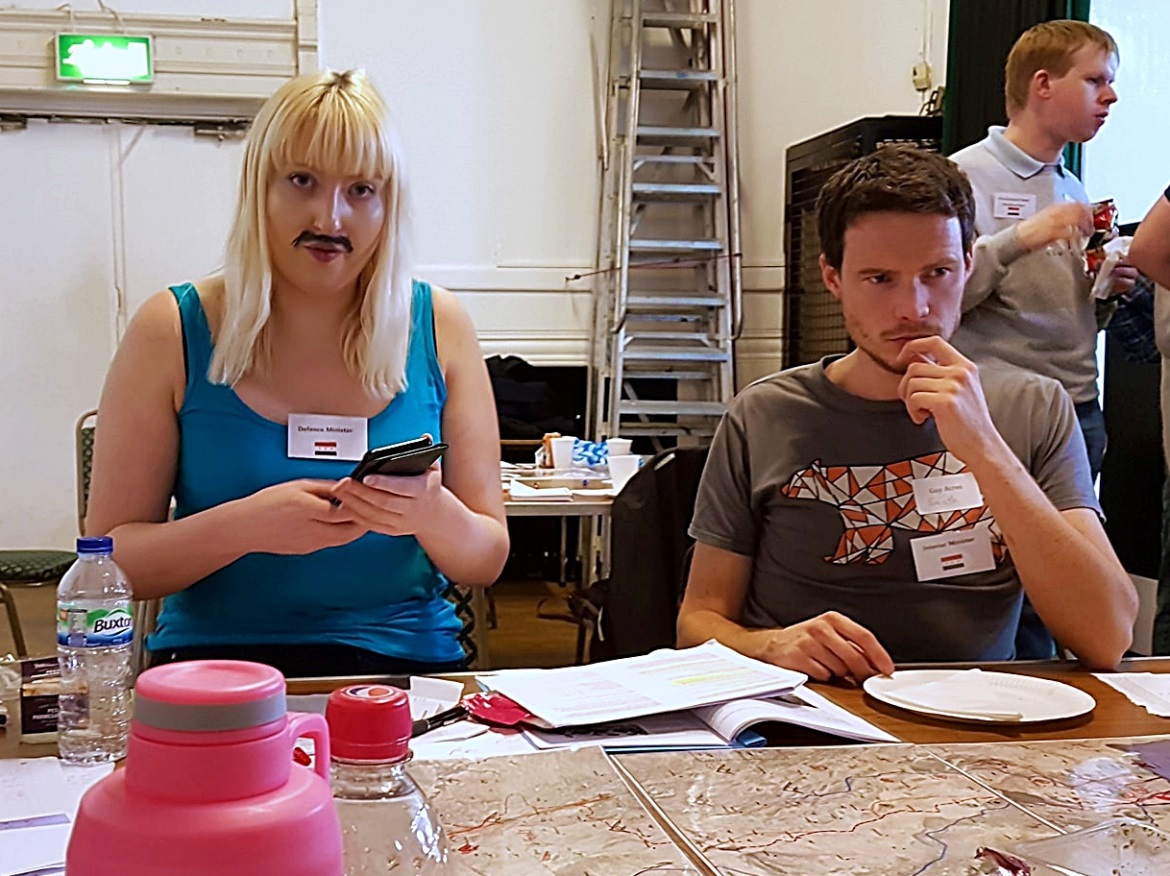
That was it. The Moderates wanted me out – while they couldn’t remove the last member of a faction, they could certainly replace me with a far less experienced Tikriti member, one that would be more easily bought or swayed. And I very much doubted I’d be leaving the Council Chamber with my life, not when Saddam was this riled up.
But then… the impossible happened. The Moderates didn’t move an inch. Didn’t throw down a card, didn’t throw down an accusation or a challenge. I was so stunned, that I almost forgot to play a card in my own defense: an Ace, which easily beat Alex’s king.
I was alive. And I knew I’d been saved for something important.
Peace Talks
I’d been one of the council holding out on agreeing to a peace with the Iranians. Fighting the war to the grim bitter end would be a glorious death, while admitting defeat would only bring shame, or so I thought.
But now, with my life back in my hands, I felt like a new person. I immediately gave a truthful report to the council, and the council finally agreed to try to come to terms with the Iranians. The First Minister and Foreign Minister went into negotiations, and the game ended while they were still trying to come to terms.
Aftermath
We definitely didn’t win the war… but I don’t think we decisively lost either. What we did do was change the shape of the future of the Middle East. An American-Iraqi alliance means that the war in Iraq would probably never happen. The demolition of Kharg punched a serious hole in the Iranian economy, one that would take years to repair. And we had the Shatt al-Arab river back under Iraqi control – a small win, but it was in our war goals.
Undeniable Victory was a really interesting game. It took a part of history I knew less than nothing about, and brought it to life in a really concrete way. Ben remains one of my favourite megagame designers for making a game that I had no interest in into one of the best games of the year… though I’m looking to playing some slightly less psychotic characters in 2018!
My last megagame of 2017 is The Last Romans, 25th November in Manchester, where I’ll be Control.
